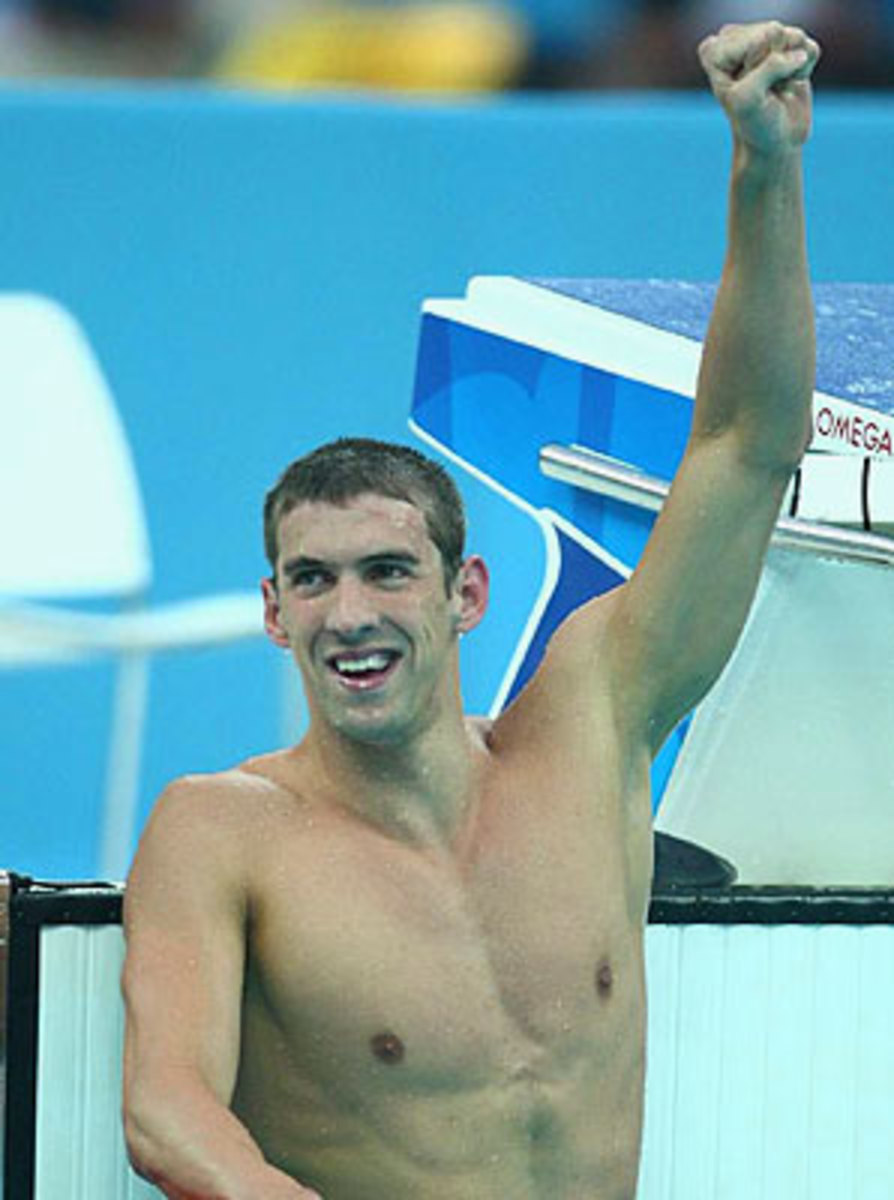
Phelps takes major step toward eight golds with dominating 400 IM
As a benchmark for Phelps' chase for eight gold medals at the Beijing Games, the world-record swim in the 400-meter individual medley (4 minutes, 3.84 seconds), was a daunting gauntlet. This effort broke the world mark of 4:05.25 he set at the Olympic trials in Omaha last month, when he said he felt like "my body was about blow up in the last lap."
This was a danger race for Phelps. On his tail, he had his ambitious teammate Ryan Lochte ("the man who would be Phelps, if not for Phelps") and Laszlo Cseh, the veteran Hungarian who broke 4:08 barrier in June, something not even Phelps had done until last year. He left both in his wake. He will have other challenging races in Beijing, including the shorter 200 IM, in which he'll face Lochte and Cseh again, the 100 butterfly in which inconsistent teammate Ian Crocker will be gunning for him and three relays that can always go amiss. Yet even those seem manageable after his commanding performance in the 400 IM. It wasn't only the time, but the way he went about it.
Phelps didn't blow his rivals out of the water from the opening dive, an easy pitfall when the energy is still high in the first final; he saved the necessary gas for the breaststroke leg, the fifth and sixth laps of the eight-lap race that have always been his most challenging. At the 200-meter mark, Phelps led Lochte by just two-tenths of a second. Surely he would soon fall behind Lochte before trying to chase him down in the freestyle leg.
"As soon as I turned at 200 and saw Ryan and Laszlo right there," Phelps said, "I told myself, 'Oh, yeah, this is going to be fun, huh? It's going to be painful."
Instead, Phelps powered ahead in the stroke he has most tried to improve, swimming the first 50 of the breaststroke in 34.77 seconds. "I never expected to go that fast," he said. "I've never done that under 35."
Phelps stubbornly worked on making technical tweaks that paid off Saturday night: bringing his hands back more quickly, popping his head out and forward instead of straight up, almost defiantly challenging the stroke to get the better of him.
Once he was ahead at the 300-meter mark, Phelps forged ahead with his superior freestyle. Cseh pulled in behind him, 2.32 seconds behind. Lochte hit a wall and finished in 4:08.09. When the piano jumped on his back, Phelps simply sat down and started to play a masterpiece. The same stamina that can carry him through his most demanding race is a barometer as to the level of stamina he will have for a nine-day meet. This is bad news for the other lanes.
Though nothing about the race itself caught Phelps off guard, the victory ceremony almost floored him. "I wanted to sing on the medal stand," he said, "but I couldn't stop crying. I was thinking about the ups and downs of the past year."
Chalk up the emotional outburst to the broken wrist he suffered earlier in the year; the decision he and his coach, Bob Bowman have made to move their training base away from Baltimore and away from Michigan at the end of the Games; his impending evolution from a versatile medley swimmer to a sprinter who will look more closely at the shorter freestyle events he has only dabbled in; the demands of being a public figure; the still-frosty relationship he has with his divorced father; and the personal challenges of keeping friendships and relationships afloat as people try to take pieces of him.
But chalk it up to this, too. Phelps is trying to reach a milestone no athlete has managed in any sport in over a century of the modern Olympics. Look at it from a distance and eight seems implausible because of all the places where things can go wrong. By snagging the first one so decisively, Phelps has not only removed one of his potential landmines; he has made the twisting road ahead look eminently more navigable.




